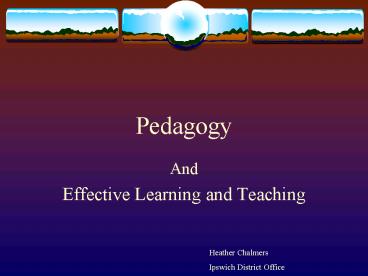Pedagogy - PowerPoint PPT Presentation
1 / 20
Title: Pedagogy
1
Pedagogy
- And
- Effective Learning and Teaching
Heather Chalmers Ipswich District Office
2
Where are we going?
- Linking where teachers are now
- Present and future expectations
- Where are these demands coming from?
- What are teachers presently doing?
3
- There is an expectation by principals that
staff members either through pre-service training
or - in-service training have gained insight into
their craft by studying - Psychology (cognitive and developmental)
- Learning theory and method
- Professional ethics
4
What does that mean in reality?
5
Lets explore the vital area of pedagogy
- Middleton and Hill 1996
- The industrial model of curriculum delivery
- (content focus / fixed time periods / teacher
focused pedagogy / measuring of outputs) - does not equip students for new times.
6
- Luke 1999
- we have a pedagogical problem ----- we teach
subjects rather than children and there is a lack
- of intellectual engagement.
7
Pedagogy is the art of teaching.
- Authentic pedagogy is that individual craft of
teaching as an interaction between learner and
teacher. - Productive pedagogy is the art of teaching
recognized as being productive in the realisation
of student learning outcomes.
8
gtgtgt
- Authentic productive pedagogy where teachers
adapt/select/use recognized and validated
teaching strategies with their students to ensure
planned learning outcomes.
9
- Where has the current focus come from?
- How is it focused?
- How is it maintained?
- How to stay positive?
10
- The Documents
- 2010 Queensland State Education
- Core Curriculum for Years 1-10
- in Education Queensland Schools (Draft)
- KLA Syllabus
- (Understanding Learners and Learning / Lifelong
Learner Attributes / Cross Curricular Priorities) - Framework for an Outcomes Approach in Education
Queensland School Communities (Draft)
11
How is it focused?
- The school community sets their ideal
expectations (the vision for student learning
outcomes). - A pedagogical framework is organised around the
ideal expectations. - This framework exercises strategies into planned
learning experiences which allow for the
demonstration of successful learning outcomes.
12
We know from national and international
research(Wisconsin-Madison Uni, Hill - 1998,
SRLS Research Team - 1999, etc)
Quality of learning outcomes of students
Quality of pedagogy in classrooms
Structural and cultural change in a school
13
What are the strategies within the productive
pedagogies?
- Higher-order thinking
- Deep knowledge
- Substantive conversation
- Knowledge problematic
- Metalanguage
- Knowledge integration
- Background knowledge
- Connectedness to the World
- Problem-based curriculum
- Student control
- Social support
- Engagement
- Explicit criteria
- Self-regulation
- Cultural knowledges
- Exclusivity
- Narrative
- Group Identity
- Citizenship
14
Have been grouped into four dimensions
- INTELLECTUAL QUALITY
- RELEVANCE
- SUPPORTIVE CLASSROOM ENVIRONMENT
- RECOGNITION OF DIFFERENCE
15
What can we do with this information?
- endless strategies that can be employed by
teachers - nothing new - realignment and purposeful
emphasis with an OA - a focus on recognising pedagogy with the
systematic planning to employ appropriate
strategies - ensure the development of learning outcomes
- use current educational thinking research to
focus on ways to deepen understanding and expand
learning - Bloom, Gardner, De Bono,Hill, Fullan,T L
Foundation
16
- Encourage teachers to adopt/adapt strategies into
their repertoire of teaching skills - co-operative learning, modelling, mentoring
- Using familiar reference materials that are in
Education Queensland schools - The Principles of Effective Teaching and
Learning
17
Outcome Approach Principle
DESIGN DOWN
DELIVER UP
Lifelong Learner -Complex Thinker
Futures perspective (KLA CC)
Intellectual Quality
Higher-order thinking Are higher-order
thinking and critical analysis occurring?
EFFECTIVE TEACHING AND LEARNING (2.1.4)
18
ETL descriptors and indicators in response to
focus questions relating to a productive
pedagogical strategy.
- A range of thinking skills is explicitly taught
(2.1.4) - Indicators
- Strategies are used to engage students in a range
of thinking skills - Teacher demonstrates and models learning through
- talking
through the thinking processes - -metacognitive demonstration
- - modelling steps and stages of a task
- - demonstrating a variety of approaches to
problem solving using various resources
and materials - Thinking skills such as CORT, Six hats and Top
Level structure are taught.
19
Multiple uses of the resource
- focus on one dimension of pedagogy per term, per
unit, per year --- eg Intellectual
Quality - incorporate a strategy for a semester for each
year level - eg group identity or substantive
conversation - The most valuable staff involvement would be the
reflecting and sharing of experiences!
20
- The ETL Review Kit contains ----
- CHECKLIST for TEACHER REFLECTION
- on CLASSROOM PRACTICES
- So tracking of what has, and what will be
incorporated, is already prepared for school use.





![❤[READ]❤ Queering Vocal Pedagogy PowerPoint PPT Presentation](https://s3.amazonaws.com/images.powershow.com/10048455.th0.jpg?_=202406051010)

























